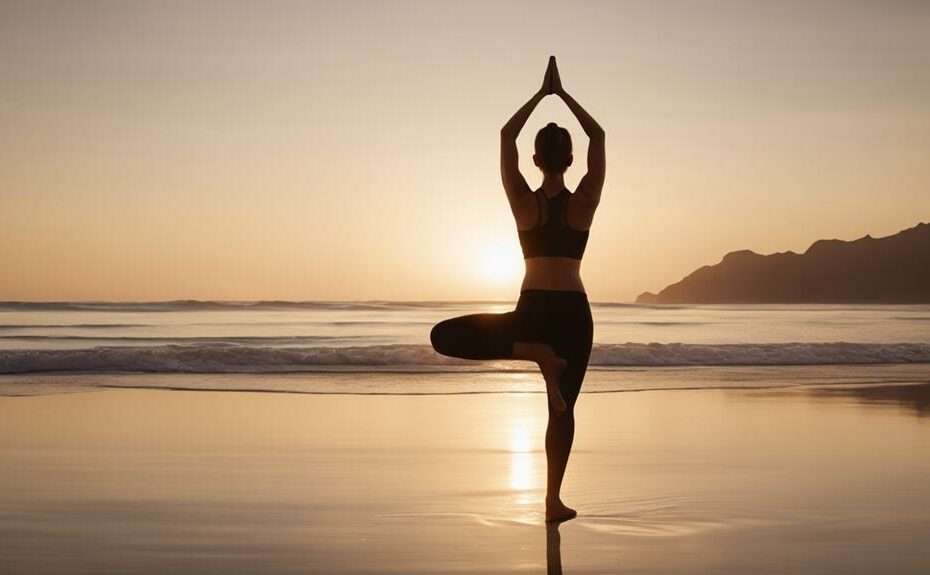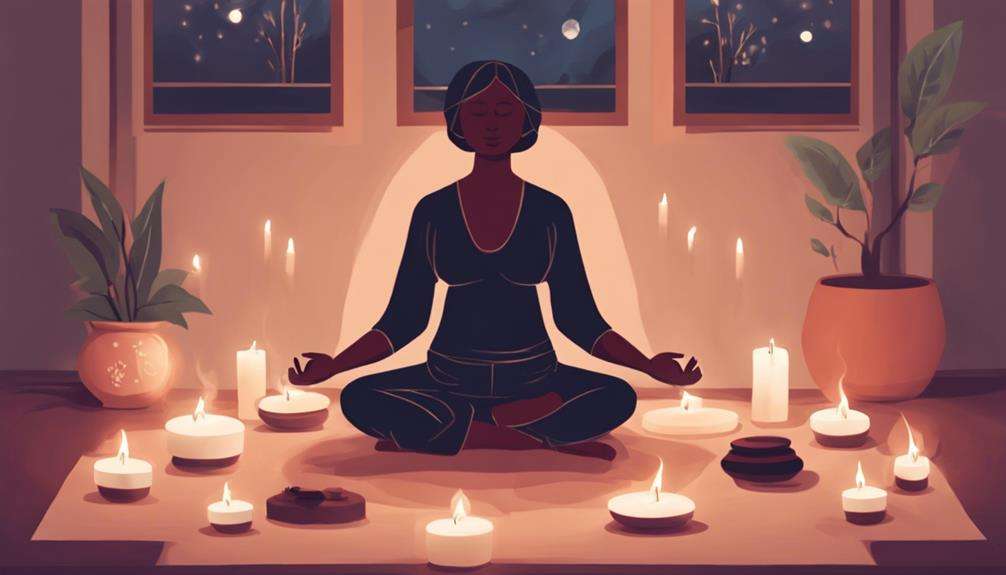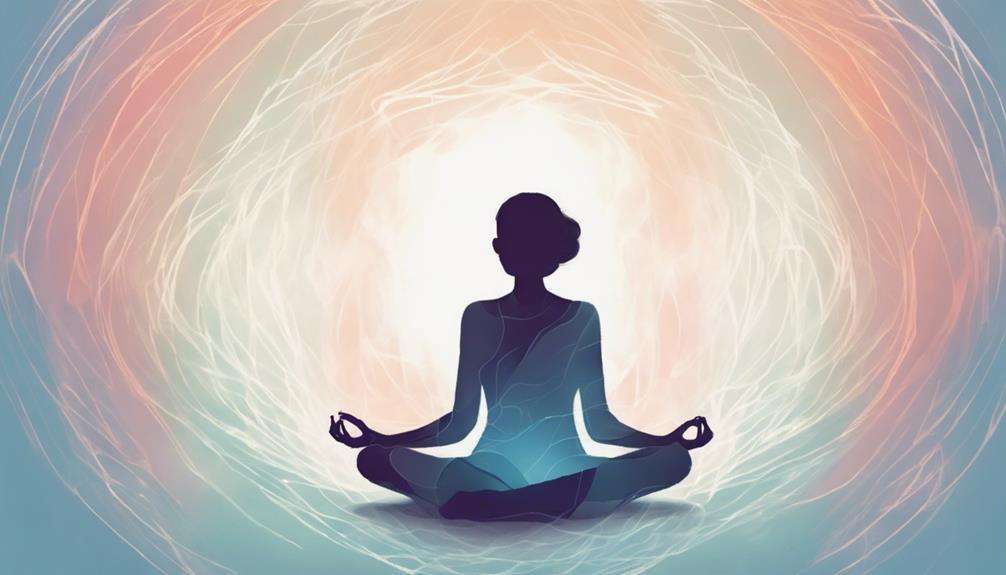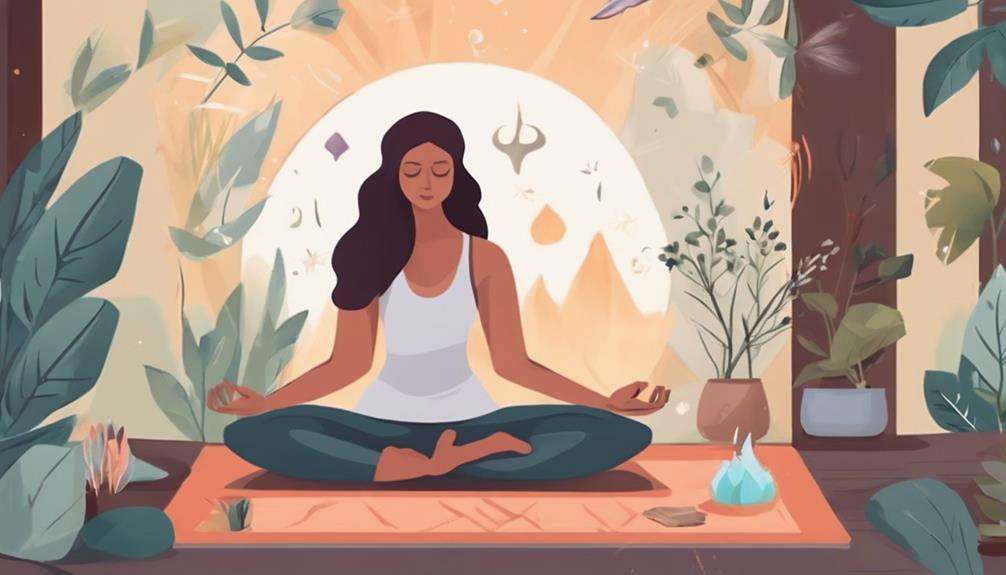Imagine a scenario where you find yourself overwhelmed with work deadlines, family responsibilities, and personal worries. You feel your heart racing, palms sweating, and mind racing with anxious thoughts. In these moments, you may wonder how to find calm amidst the chaos.
The practice of yoga and meditation offers a path to serenity and peace, allowing you to navigate life's challenges with a sense of balance and clarity. Through simple yet powerful techniques, these ancient practices can transform the way you approach stress and anxiety, offering you a sanctuary of tranquility in a hectic world.
Key Takeaways
- Yoga and meditation activate the parasympathetic nervous system to reduce anxiety levels.
- Mindfulness practices enhance emotional well-being by calming the mind and managing stress.
- Consistent practice increases beneficial brain chemicals for improved mood and resilience.
- Breath awareness techniques in meditation alleviate anxiety, promoting inner peace and mental clarity.
The Science Behind Yoga and Meditation
The science behind yoga and meditation reveals how these practices effectively lower stress hormones, increase beneficial brain chemicals, and enhance mental well-being. When you engage in yoga and meditation, you activate your parasympathetic nervous system, which helps reduce stress and anxiety. These practices go beyond just physical movements and breathing techniques; they've a profound impact on your brain chemistry. Brain imaging studies have shown that regular yoga practitioners have higher levels of beneficial brain chemicals, contributing to improved mental health. By incorporating mindfulness into your routine through yoga and meditation, you can significantly reduce anxiety levels and improve your overall well-being.
Furthermore, research indicates that yoga and meditation can have similar effects to cognitive behavioral therapy (CBT) in reducing symptoms of anxiety and depression. The cognitive aspects of these practices help you reframe negative thought patterns and promote a healthier mental state. By regularly practicing yoga and meditation, you not only improve your physical health but also enhance your brain function and emotional resilience.
How Meditation Calms the Mind
When you practice mindfulness, you allow yourself to observe your thoughts without judgment, creating a sense of detachment from stressful thinking patterns.
Focusing on your breath during meditation helps anchor your attention to the present moment, reducing rumination and anxiety.
Mindfulness Practice Benefits
Activating the parasympathetic nervous system through meditation offers a powerful way to calm your mind and reduce negative emotions. Mindfulness practice plays a crucial role in managing anxiety levels by calming the nervous system.
Individuals who regularly engage in meditation show higher levels of good brain chemicals on brain imaging scans, indicating improved emotional well-being. The practice of mindfulness is linked to elevated levels of GABA, a neurotransmitter associated with better mood and decreased anxiety.
Breath Awareness Techniques
Utilizing breath awareness techniques in meditation offers a powerful method to calm your mind and alleviate anxiety. By focusing on your breath during meditation, you can effectively regulate your emotions, reduce stress, and promote relaxation.
These mindful breathing exercises activate the parasympathetic nervous system, which helps in achieving a state of inner peace. Practicing breath awareness techniques enhances mental clarity, allowing you to navigate through anxious thoughts with a more composed mindset.
Through consistent meditation incorporating breath awareness, you can manage anxiety levels and cultivate a sense of calm within yourself. Embracing these techniques not only soothes the mind but also contributes to overall well-being by fostering a heightened state of awareness and tranquility.
Yoga for Physical Relaxation
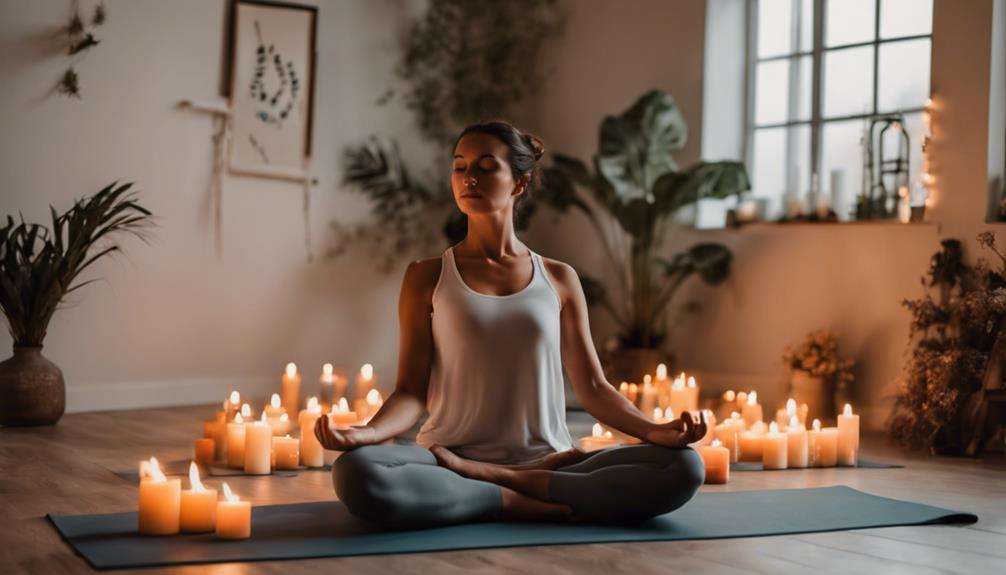
For achieving physical relaxation through yoga, it's beneficial to understand how this practice activates the parasympathetic nervous system and enhances overall well-being. Yoga promotes physical relaxation by reducing stress hormones and increasing endorphins and GABA levels.
Here are five key benefits of yoga for physical relaxation:
- Activates the parasympathetic nervous system, leading to a state of deep relaxation.
- Reduces levels of stress hormones in the body, such as cortisol, promoting a sense of calm.
- Increases endorphins, the body's natural painkillers, which can help alleviate anxiety symptoms.
- Boosts levels of gamma-aminobutyric acid (GABA), a neurotransmitter that calms the brain and reduces feelings of anxiety.
- Enhances overall well-being by promoting relaxation, reducing muscle tension, and improving sleep quality.
Engaging in yoga regularly can't only help with physical relaxation but also contribute to better stress management and overall mental health.
Mindfulness Practices for Anxiety Relief
Mindfulness practices, such as yoga and meditation, offer effective strategies for relieving anxiety by promoting relaxation and calming the mind.
Yoga, through stimulating the vagus nerve, plays a crucial role in modulating the stress response, leading to a state of relaxation vital for anxiety relief. The deep and steady breathing techniques in yoga, known as pranayama, can effectively calm the sympathetic nervous system, alleviating symptoms of anxiety.
Furthermore, meditation enhances self-regulation and mindfulness, providing a potent tool for managing anxiety and fostering a sense of calmness. Research consistently supports the efficacy of mindfulness practices like yoga and meditation in reducing anxiety levels and enhancing overall mental well-being.
Breathing Techniques for Stress Reduction
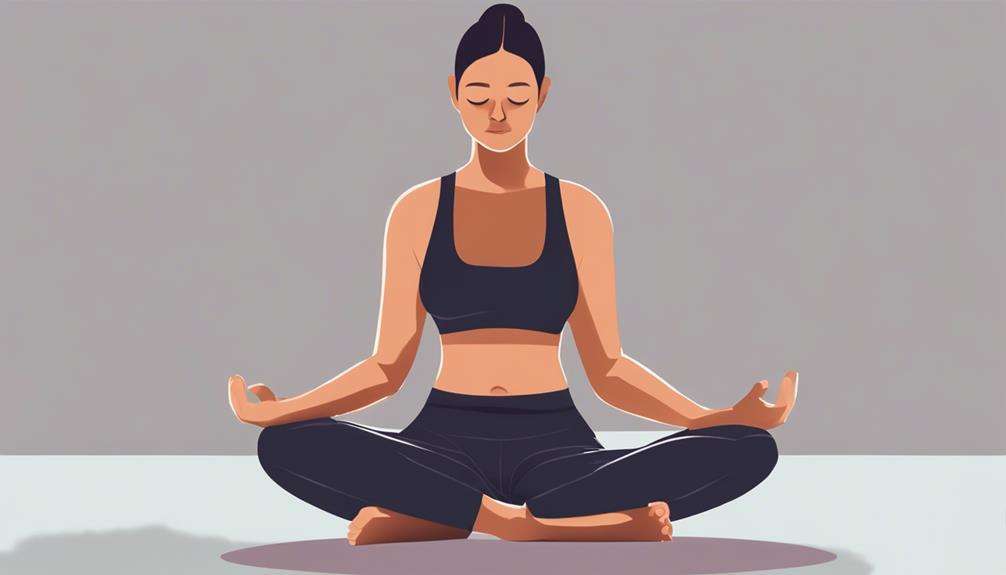
Transitioning from mindfulness practices, such as yoga and meditation, to specific breathing techniques for stress reduction is a natural progression towards fostering relaxation and alleviating anxiety. By incorporating pranayama and other breath work into your routine, you can actively engage the physiological mechanisms that govern your body's stress response. Here are some key points to consider:
- Specific breathing techniques in yoga, like pranayama, help regulate the sympathetic nervous system for stress reduction.
- Deep, controlled breathing patterns activate the parasympathetic nervous system, promoting relaxation and reducing anxiety.
- Pranayama practices influence heart rate variability through the stimulation of the vagus nerve, aiding in stress relief.
- Consistent practice of breath work in yoga can improve overall well-being by calming the mind and body.
- Utilizing breath work in yoga can enhance mindfulness, self-awareness, and emotional regulation, key factors in reducing anxiety.
Integrating Yoga Into Daily Routine
Incorporating yoga into your daily schedule can significantly enhance your ability to manage anxiety and promote overall well-being. By dedicating just 10 minutes each day to practicing yoga, you can experience a notable reduction in anxiety levels. This ancient practice offers a unique blend of relaxation and mindfulness techniques that work harmoniously to calm the mind and body.
Yoga provides a holistic approach to combating anxiety, focusing on both the mental and physical aspects of well-being. As you integrate yoga into your routine, you may notice a gradual improvement in your mental health and a decrease in stress levels. Consistent practice not only helps in managing current anxiety but also builds resilience against future triggers, contributing to enhanced emotional stability.
Embracing yoga as part of your daily regimen can lead to a profound sense of relaxation and inner peace. It's a powerful tool that empowers you to cultivate mindfulness, reduce stress, and foster overall mental well-being, ultimately enabling you to navigate life's challenges with greater ease and resilience.
Frequently Asked Questions
How Does Yoga and Meditation Help With Anxiety?
Yoga and meditation aid anxiety by promoting stress relief through deep breathing and mindfulness. They enhance focus, emotional regulation, and calmness. These practices offer physical activity, hormone balance, and a holistic coping mechanism for managing stress.
Why Does Meditation Reduce Anxiety?
Meditation reduces anxiety by triggering the relaxation response, calming your mind through breath awareness and neuro changes. It enhances self-awareness, equipping you with coping skills, emotional regulation, and cognitive restructuring, fostering a healthy mind-body connection.
How Yoga Cured My Anxiety?
Yoga and meditation transformed your anxiety. The mind-body connection became clear. They became your coping mechanism, offering stress relief and emotional balance. Integrate them into your self-care routine for relaxation techniques, holistic approach, and mental clarity.
What Are the Mental Benefits of Yoga and Meditation?
Embrace the mental marvels of yoga and meditation! Enhancing your mind-body link, these practices provide stress relief, emotional balance, and increased focus. Dive into relaxation techniques for coping skills, mental clarity, and inner peace.
Conclusion
In conclusion, incorporating yoga and meditation into your daily routine can significantly reduce anxiety and improve overall mental well-being.
Did you know that a study showed that just 10 minutes of daily meditation can decrease symptoms of anxiety by 60%?
By practicing these techniques, you can calm your mind, relax your body, and cultivate mindfulness to combat anxiety effectively.
So, take a few minutes each day to prioritize your mental health and experience the benefits for yourself.
